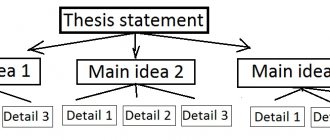How to learn words with children?
- Children remember words easily , but it is believed that before the age of 3, children can learn any language fluently.
- First of all, learning should not be intrusive and greatly tire children, otherwise you risk completely discouraging the desire to learn a foreign language. You can study English words with your children in songs and poems, play various games or watch cartoons in English. The main thing is that the children like it!
- It is best to start with spoken English , since we begin to learn our native language in the same way. It is speaking, writing sentences and trying to express your thoughts that best helps children remember words in English.
- You can spend at least half an hour studying English words, but every day! It is daily work that is the key to success.
- It is very important that spoken English should be taught directly by a native speaker. Children remember everything as it is, and if they learn some sounds incorrectly, it will be much more difficult to relearn them! Watch cartoons online in the original language or listen to audio recordings recorded by native English speakers.
- Children remember images well , so you can learn words from pictures that you can print or create using some program, books or coloring books. A good option is to put stickers with English words on objects around.
- In addition to individual words, study phrases and phrases , then children learn grammar on a subconscious level.
- From the tables below you can make cards that significantly speed up the learning of English words. Cut out 3x5 cm cards from paper or cardboard, write the English version of the word with transcription on one side, and the translation on the back. Then you will be able to study words with your children both from English into Russian and from Russian into English, which will be even more effective. Children will also remember their spelling and learn to read them.
Regular and irregular English verbs
To explain the next topic, Past Simple, we will tell you about regular and irregular verbs in English. Regular verbs change according to a single rule - by adding the ending -ed. Irregular verbs do not follow any rules when forming past tense forms. Look how the irregular verbs “start”, “come”, “find” change:
- begin – began – begun - to begin;
- come – came – come – to come;
- find - found - found - to find.
Let us immediately inform you: there are no signs by which you can determine whether a verb is correct or not. The only “hint” is the table of irregular verbs, which we will give below. In the first column the verb itself is written, in the second - the form for the simple past tense Past Simple, in the third - the form for the Perfect tenses, which we will tell you about later, when we go through the beginner-level topics. This table must be memorized.
Download the table of irregular verbs from this link and start studying it. By the way, our teacher Irina composed simple poems for easy memorization of many irregular verbs, you will find them in this article.
Verbs that are not in the table are regular. In the past tense, their endings will be formed according to the following principles:
- In most cases we add the ending -ed: look (look) – looked.
- If the verb ends in -e, add -d: live (live) – lived.
- If the verb is monosyllabic (it has one vowel sound) and ends with a consonant, then it is doubled before adding the ending -ed: stop (stand) – stopped.
- If the verb ends in -y, and there is a consonant before -y, then the ending changes to -ied: study (to study) – studied.
- If the verb ends in -y, and there is a vowel before the -y, then the ending -ed is simply added to the word: play (play) – played.
Now let's learn how to talk about the past in English using the Past Simple.
English words for children: where to start?
You should start teaching English words with children with the most common and popular phrases, namely greetings and farewells. A child may not fully know the alphabet, but he will still remember words and phrases.
Words in English for children on the topic “Greetings”
| Word in English | Transcription | Pronunciation in Russian letters | Translation |
| Hello! | [həˈloʊ] | hello | Hello! |
| Hi! | [haɪ] | hi | Hello! |
| Good Morning! | [ɡʊd 'mɔ:niη] | Good Morning | Good morning! |
| Good Afternoon! | [ɡʊd 'ɑ:ftə'nu:n] | gud Aftenun | Good afternoon |
| Good Evening! | [ɡʊd 'i:vniη] | good Ivnin | Good evening! |
Teach children classical English, avoid informal words and phrases such as “What's up?”, “Hey there!” and so on. He can easily learn them later, but first of all he must have a base of “correct” English.
Words in English for children on the topic “Farewells”
These phrases are suitable not only for kids, but also for beginners learning the language.
| Word in English | Transcription | Pronunciation in Russian letters | Translation |
| Goodbye! | ['gud'bɑi] | goodbye | Goodbye! |
| Bye! | [bɑi] | bye | Bye! |
| See you later! | [si: ju ˈleɪtə(r)] | si yu leita | See you later! |
| Have a good day! | [həv e gud deɪ] | have a good day | Have a good day! |
Words in English for children on the topic “Etiquette”
Polite treatment and conversation are very important in English, so it is necessary that children not only know the basic words of etiquette, but also generally perceive the style of communication in English, because it differs significantly from the Russian language.
| Word in English | Transcription | Pronunciation in Russian letters | Translation |
| Sorry | ['sɔri] | sorry | Sorry)! |
| I am sorry! | [ˈaɪ ˈem ˈsɒri] | ah um sorry | Excuse me! |
| Excuse me! | [ɪkˈskjuːz miː] | exUse mi | Sorry (when contacting)! |
| Please... | [pliːz] | plz | Please… |
| Thank you! | [θæŋk juː] | Senk Yu | Thank you! |
| You are welcome! | yu and UElcom | Please! | |
| What a drink! | [wɒt ə ˈpɪti] | wot e piti | What a pity! |
Words in English for children on the topic “Food”
| How should a word be written in English? | Transcription | Pronunciation and reading in Russian letters | Translation |
| bread | [bred] | Brad | bread |
| soup | [suːp] | soup | soup |
| sugar | [ˈʃʊɡə] | SUGAR | sugar |
| meat | [miːt] | mit | meat |
| sausage | [ˈsɒsɪdʒ] | sOsij | sausage |
| cheese | [tʃiːz] | cheese | cheese |
| butter | [ˈbʌtə] | bata | butter) |
| fish | [fɪʃ] | fish | fish |
| cutlet | [ˈkʌtlɪt] | catlit | cutlet |
| egg | [eɡ] | eg | egg |
| salad | [ˈsæləd] | withElad | salad |
| mushroom | [ˈmʌʃrʊm] | mashroom | mushroom |
| porridge | [ˈpɒrɪdʒ] | PORIDGE | porridge |
| sandwich | [ˈsænwɪdʒ] | with Sandwich | sandwich, sandwich |
| pie | [paɪ] | share | pie |
| sweet | [swiːt] | suite | sweet, candy |
| cake | [keɪk] | cake | cake |
| jam | [dʒæm] | jam | jam |
| honey | [ˈhʌni] | xAni | honey |
| cookie | [ˈkʊki] | Cookies | cookie |
| chocolate | [ˈtʃɒklət] | chokolat | chocolate |
| ice-cream | [aɪs ˈkriːm] | Icecream | ice cream |
| water | [ˈwɔːtə] | uOta | water |
| milk | [mɪlk] | milk | milk |
| tea | [tiː] | you | tea |
| juice | [dʒuːs] | juice | juice |
| yogurt | [ˈjɒɡət] | yOgat | yogurt |
Verb structure
Based on their structure, English verbs are divided into simple, derivative, complex and compound (phrasal).
- Simple (usually short and from the same root): work, play, eat.
- Derivatives (they have suffixes and prefixes): replay, enrich, prepare.
- Complex (consist of two small words that are written together): underline, overtake.
- Compounds (also called phrasal, they consist of two words and are written separately): carry on, look after, put on.
You can read even more about mysterious phrasal verbs our article.
Non-finite verb forms
There are impersonal forms of the verb that are not conjugated by persons and are not used as a predicate: infinitive, gerund and participle.
The infinitive names an action and always answers the question “what to do?” The formal sign of the infinitive is the particle to. It can be used in a sentence with different functions.
To eat apples is good for health – Eating apples is good for health (subject). Tom desperately wanted to win the contest. - Tom desperately wanted to win the competition (direct object). We left early (in order) to avoid the traffic. – We left early (in order) to avoid traffic (purpose circumstance). You have the right to remain silent. – You have the right to remain silent = You have the right to remain silent (definition).
The infinitive is used after certain verbs. List of the most used:
afford - to allow (financially) agree - to agree aim - to aim ask - to ask, to ask decide - to decide expect to expect fail - to fail hope - to hope learn - to teach offer - to offer plan - to plan prepare - to prepare promise - to promise refuse - to refuse seem - seem
There are several moments in English in which the infinitive is used without the particle “ to ” and is called “bare infinitive”.
- With the verbs “ let ” and “ make ”:
I let them go.– I let them go = I let them go. The news made him change his mind. – The news made him change his mind.
We recommend reading! Is there a difference between Do and Make?
- With feeling verbs :
I heard you sing . - I heard you sing. I saw them play together. – I saw that they played together.
- With modal verbs :
You can stay with us. -You can stay with us.
- The construction " do " + " verb " is used to enhance emphasis .
I do believe in Santa. – I still (I really) believe in Santa.
A gerund is a non-finite form of a verb that is used as a noun and can serve different functions. Let's look at examples:
Knitting takes a lot of patience. – Knitting requires a lot of patience (subject). His car needs washing. – His car needs washing (direct object). Martha gives playing the piano all her spare time. – Martha devotes all her free time to playing Mom praised Billy for keeping his room clean. – Mom praised Billy for keeping the room clean (addition after the preposition).
The topic of gerunds in more detail in our article.
A participle is an impersonal form of a verb that answers the question “ what is he doing?” " (present participle) or " what done? " (past participle).
The past participle of regular verbs ends in “ -ed ” :
open – open ed invite – invite ed
verbs have unique past participle forms:
break – broke – broken do – did – done
The present participle ends in “ -ing ” and is a verbal adjective .
interest (interest) – interesting (interesting) excite (capture) – exciting (exciting)
To be with adverbs
Now we know when the verb to be is used in English in one tense or another. However, its potential is not limited to this. The verb has become part of common phrases with adverbs, which are used quite widely today. So, for example, to be happy means “to be happy”, to be full up - “to be satiated, to satisfy hunger”, and in expressions like to be beyond it is used in the sense of “to exceed possibilities”.
In fact, in the language there are several dozen (or even more than a hundred) combinations of this verb with adverbs. If you come across a similar construction in the text, be sure to use a dictionary - such phrases are not always used in their literal meaning. For example, to be under can be translated as “to be under something” if we are talking about an inanimate object, or used in the sense of “submit” if we mean relationships between people. Verb constructions with adjectives are translated using the same principle.
And don’t forget - in combination with adverbs, the rules for using to be are the same as when conjugating an independent verb in the present, past and future tense.
Prepositions
Prepositions of place
| Word | Russian transcription | Translation |
| Above | ebow | above |
| Behind | behind | behind |
| Below | white | at the bottom |
| Between | bitvin | between |
| In | in | V |
| In front of Near | in front of nie | front near |
| Next to | next that | near |
| On | He | on |
| Under | ande | under |
Prepositions of direction
| Word | Russian transcription | Translation |
| From | from | from, from |
| Into | intu | V |
| Out of | out of | from |
| To | that | from |
Prepositions of time
| Word | Russian transcription | Translation |
| After | afte | after |
| Ago | ego | ago (2 days ago, etc.) |
| At | this | V |
| Before | bifo | before |
| By | bye | To |
| During | Durin | during, during |
| For | fo | during |
| In | in | through |
| On | He | in (used with dates, days of the week) |
| Past | paste | after |
| Since | sins | since (some time) |
| Till/untill | til/antil | before |
| Within | Visine | during |
Common prepositions
| Word | Russian transcription | Translation |
| Because | bicosis | because |
| Due to | duh that | thanks, in accordance |
| In spite of | in space of | despite, despite |
| Through | fru | through, through |
| With | visas | With |
| Without | visa out | without |



